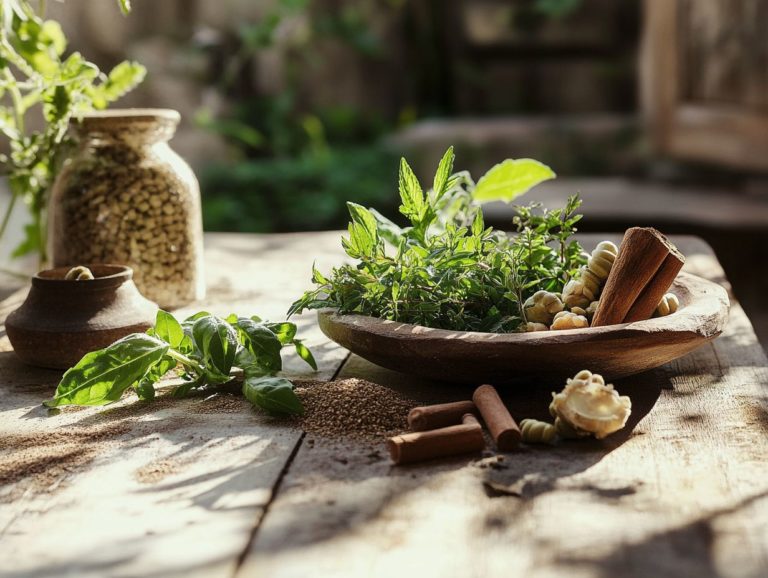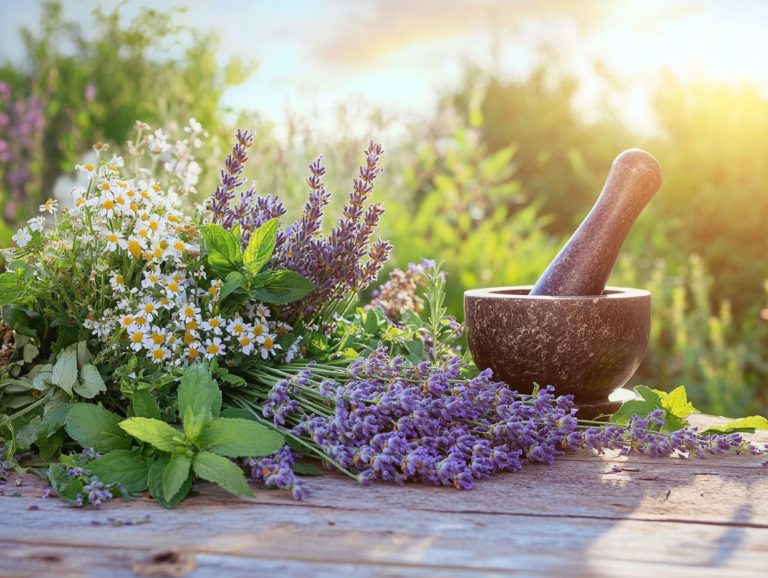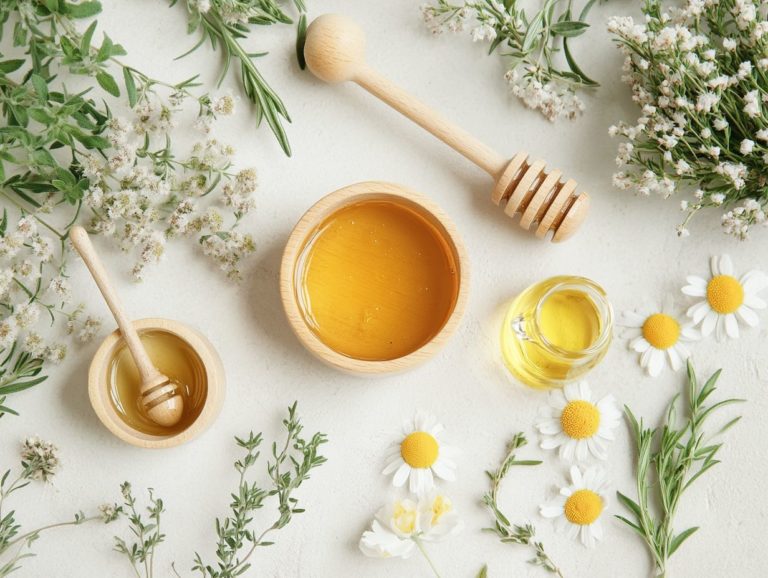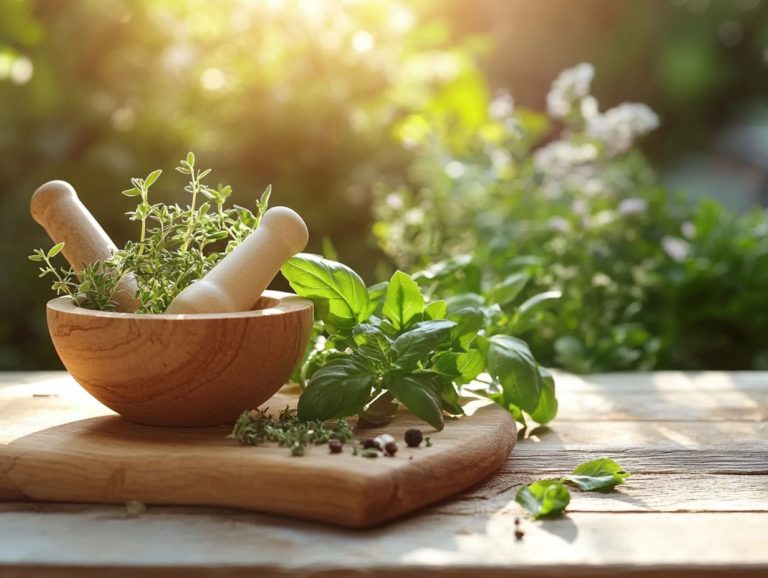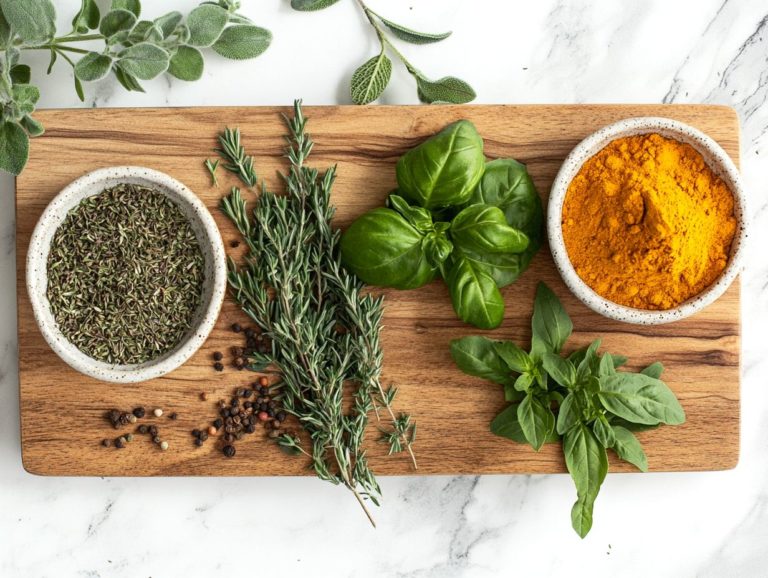Using Herbal Solutions for Cardiovascular Health
In a world that prioritizes wellness, herbal solutions are a natural way to boost cardiovascular health.
This article explores the benefits of herbs for heart health and reducing cardiovascular disease risk.
From garlic to hibiscus, you ll uncover popular herbal remedies and learn how to effortlessly incorporate them into your daily routine.
You’ll also find essential details on dosages and potential interactions.
Keep reading to discover how nature can boost your heart health!
Contents
- Key Takeaways:
- Benefits of Herbal Solutions for Cardiovascular Health
- Common Herbal Solutions for Cardiovascular Health
- How to Incorporate Herbal Solutions into Your Routine
- Frequently Asked Questions
- What are herbal solutions for cardiovascular health?
- Are herbal solutions effective for maintaining cardiovascular health?
- What are the potential benefits of using herbal solutions for cardiovascular health?
- Can herbal solutions interact with medications for cardiovascular health?
- How should herbal solutions be used for cardiovascular health?
- Are there any precautions to consider when using herbal solutions for cardiovascular health?
Key Takeaways:
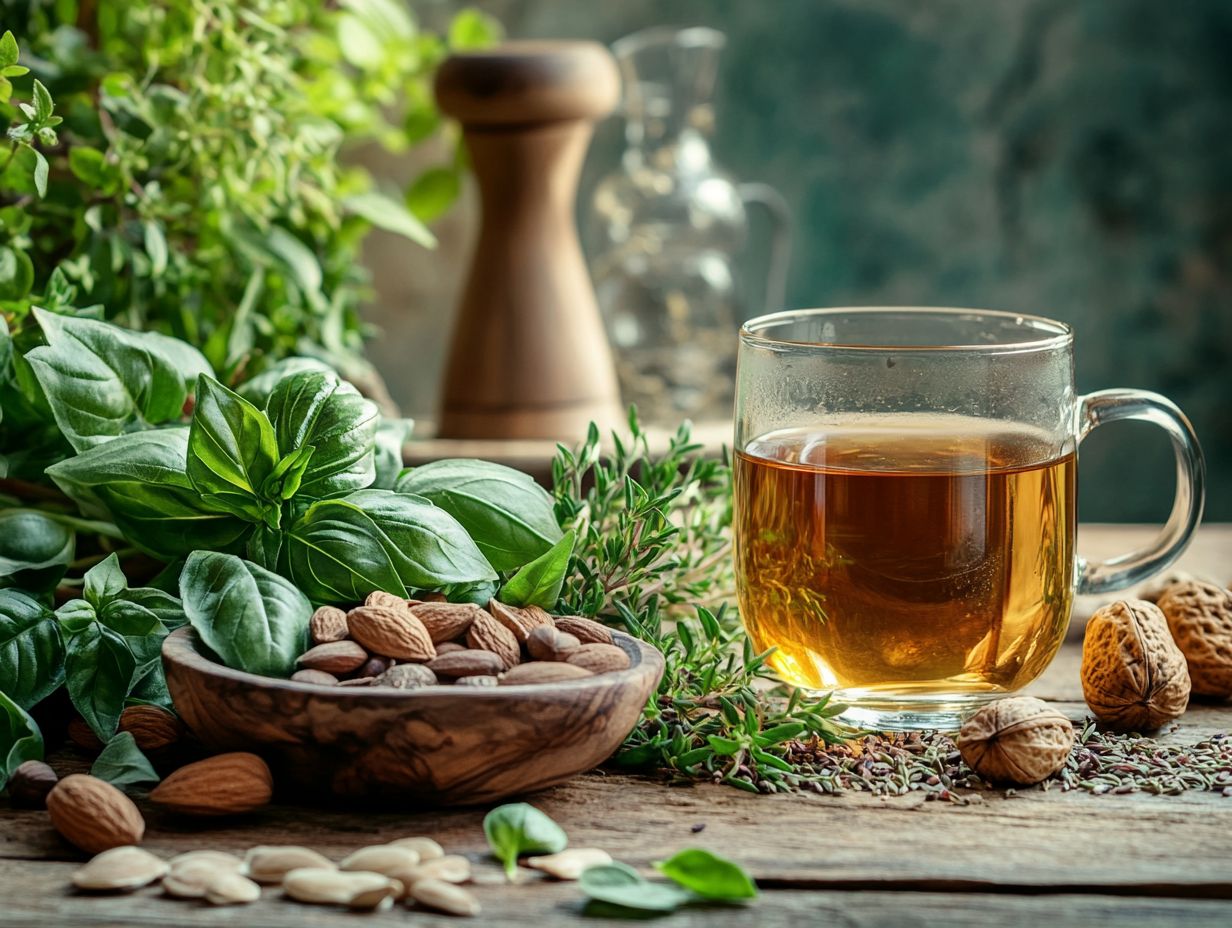
- Herbs can naturally improve heart health and reduce cardiovascular disease risk.
- Common herbs such as garlic, hawthorn, and ginger have been shown to positively affect heart health.
- When incorporating herbal solutions into your routine, be sure to follow recommended dosages and consult with a healthcare professional to avoid potential interactions and side effects.
What are Herbal Solutions?
Herbal solutions encompass the use of various herbs and medicinal plants aimed at promoting health and addressing ailments, particularly in the realm of heart health. These remedies have been the backbone of traditional medicine across cultures for centuries, revealing their therapeutic potential through their active components and unique chemical compositions.
Recently, there has been a notable surge in interest surrounding natural health sources, leading to a revival in exploring these plant-based solutions, especially for managing conditions such as hypertension and heart disease. Many are curious about herbal remedies for heart health, which are increasingly prevalent in today’s world.
The historical importance of herbal treatments stretches back to ancient civilizations, where indigenous practitioners skillfully utilized local flora to tackle various health concerns. This rich legacy persists today, as modern medicine increasingly recognizes the efficacy of these natural agents, merging traditional wisdom with scientific inquiry. A diverse array of herbs, including garlic, hawthorn berry, and ginger, are now celebrated for their contributions to enhancing cardiovascular function and lowering blood pressure, with herbal tea for heart health being a particularly popular choice.
As enthusiasm for these remedies flourishes, the significance of safety data and monitoring the safety of medicines comes to the forefront. It is essential for individuals to grasp the potential risks and benefits associated with herbal treatments, enabling them to make informed choices in their health care journey.
Benefits of Herbal Solutions for Cardiovascular Health
Herbal solutions present a wealth of benefits for heart health, effectively addressing prevalent concerns such as hypertension and heart disease. These natural treatments, sourced from plants like garlic, hawthorn, and ginkgo biloba, are celebrated for their capacity to enhance heart function, lower blood pressure, and diminish the risk of heart attacks.
The therapeutic potential of these remedies is well-documented in numerous clinical studies, underscoring their importance in fostering heart health and improving overall wellness in the population.
Improving Heart Health
Improving your heart health is vital for preventing heart disease, and several herbal remedies can significantly contribute to this effort.
Research indicates that Hauwolfia serpentina may assist in regulating blood pressure, while Crataegus monogyna has shown promise in enhancing heart contractility and reducing arrhythmias. Studies published in reputable journals confirm that these herbs can be safely combined with traditional medications, potentially boosting their effectiveness and minimizing side effects.
Integrating these herbal treatments into your comprehensive healthcare plan reflects the holistic approach many individuals pursue today. By blending conventional therapies with nature’s offerings, you can craft a balanced wellness strategy that supports not only your heart health but also nurtures your overall vitality.
Reducing Risk of Cardiovascular Disease
Reducing your risk of cardiovascular disease (CVD) is vital for maintaining long-term health. Herbal treatments have shown remarkable promise in helping you achieve this. Herbs like Terminalia arjuna and Digitalis purpurea are linked to lower blood pressure and improved heart function. These contribute to a reduced risk of hypertension and heart attacks. When you incorporate these natural solutions with conventional health care practices, they can serve as effective preventive measures.
Hawthorn (Crataegus spp.) enhances blood circulation and strengthens the heart muscle, making it a valuable ally for anyone concerned about heart health.
These herbs work by modulating vascular tone and reducing oxidative stress, both key factors in mitigating CVD. However, as you explore herbal solutions for managing hypertension, it’s crucial to consider their safety profiles and potential adverse reactions, such as allergies or interactions with medications like anticoagulants. Regular monitoring is essential to ensure these treatments complement your existing therapies effectively while minimizing risks.
Common Herbal Solutions for Cardiovascular Health
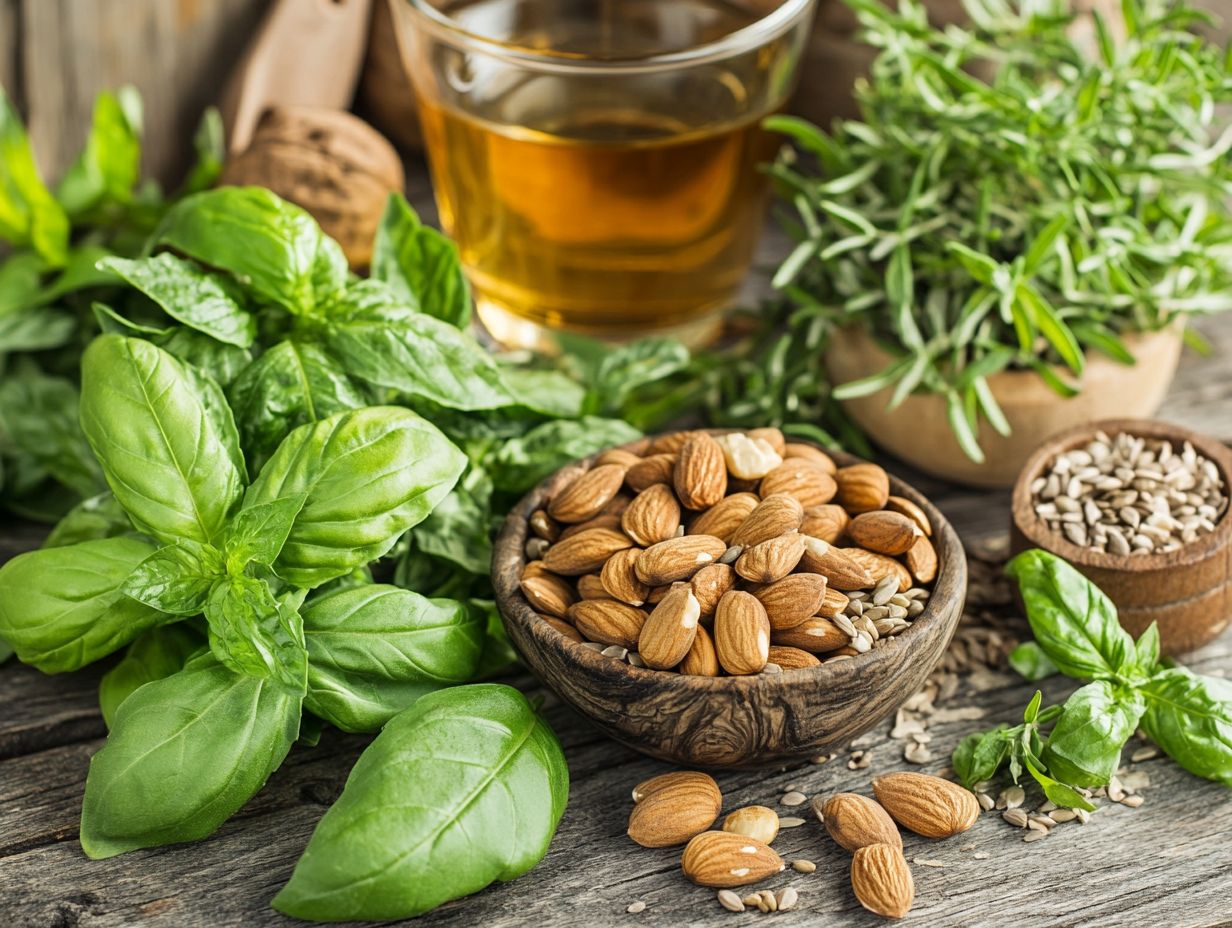
Common herbal solutions for cardiovascular health encompass a diverse array of herbs renowned for their medicinal properties. Each herb presents distinctive health benefits.
Herbs such as Garlic, Hawthorn, Hibiscus, and Ginger have long been prized in traditional medicine for their ability to support heart health, enhance circulation, and manage blood pressure effectively.
By incorporating these remedies into your daily routine, you can tap into their natural healing power to foster cardiovascular wellness.
Garlic
Discover how garlic can transform your heart health today! Garlic has been celebrated for its medicinal properties, particularly for cardiovascular health. Its active component, allicin, helps lower blood pressure and cholesterol levels. Research shows that garlic can lower the risk of heart disease and improve cardiovascular health, making it a cherished element in both traditional and modern medicinal practices.
To maximize heart health benefits, consider consuming one to two cloves of raw garlic daily. Crushing or chopping the cloves before you eat them can boost allicin production, making them even more effective for your heart. You can easily incorporate garlic into your meals add it to vegetable dishes, mix it into dressings, or opt for supplements.
If you’re on blood-thinning medications, consult your healthcare provider. Garlic may amplify the effects of these medications, potentially increasing the risk of bleeding. Understanding the balance between its health benefits and possible interactions is essential for safe consumption.
Hawthorn
Hawthorn is a highly regarded herbal remedy known for its cardiovascular effects. It enhances heart function and circulation. The active components in Hawthorn work together to boost blood flow and strengthen cardiac muscle, making it an effective choice for managing heart-related disorders. Numerous studies support its efficacy and safety, giving you confidence in its use.
This herb has been embraced across cultures for centuries to address ailments like chest pain and high blood pressure. Modern clinical studies have validated these traditional uses, revealing that Hawthorn can reduce symptoms of heart failure and improve overall heart health. For those interested in exploring natural remedies, herbal solutions offer a DIY approach to wellness.
You ll find Hawthorn available in various forms, including extracts, capsules, and teas, making it simple to weave into your wellness routine. However, be mindful of potential side effects such as gastrointestinal discomfort or interactions with medications. This highlights the necessity of consulting with a healthcare professional before starting.
Talk to your doctor before adding these powerful herbs to your routine, especially using herbal solutions for cold and flu symptoms. Your heart deserves the best care!
Hibiscus
Hibiscus has emerged as an effective herbal remedy for managing blood pressure. It is a sought-after choice for enhancing cardiovascular health. Clinical studies show that regularly sipping Hibiscus tea can lead to notable reductions in both systolic and diastolic blood pressure, providing a natural route for those looking to boost their heart health.
The magic of Hibiscus lies in its ability to inhibit angiotensin-converting enzyme (ACE), a protein that helps regulate blood pressure. Its wealth of antioxidants works to reduce oxidative stress, ultimately nurturing vascular health. You can easily enjoy its benefits by brewing dried Hibiscus flowers into a refreshing tea or adding the extract to your daily routine.
Be cautious, as Hibiscus may interact with some medications, particularly diuretics and antihypertensives. Its effects may increase when combined with other herbal remedies like garlic or hawthorn, both of which also promote heart health.
Ginger
Ginger is a remarkable herb that s not just a culinary superstar but also plays a significant role in promoting cardiovascular wellness. With its powerful anti-inflammatory properties, ginger can help reduce arterial inflammation and improve circulation. This makes it an invaluable addition to any regimen aimed at enhancing heart health.
You ll find that ginger offers a plethora of health benefits. It can alleviate nausea and improve digestion. It also supports joint health thanks to its natural pain-relieving properties.
For optimal results, the recommended dosages of ginger vary based on its form. You might enjoy fresh ginger brewed as a soothing tea, while powdered ginger can elevate your smoothies, curries, or baked delights.
While ginger is generally safe, be mindful of potential side effects like mild gastrointestinal discomfort and interactions with certain medications, especially blood thinners. Always consult with a healthcare provider before significantly increasing your ginger intake.
How to Incorporate Herbal Solutions into Your Routine
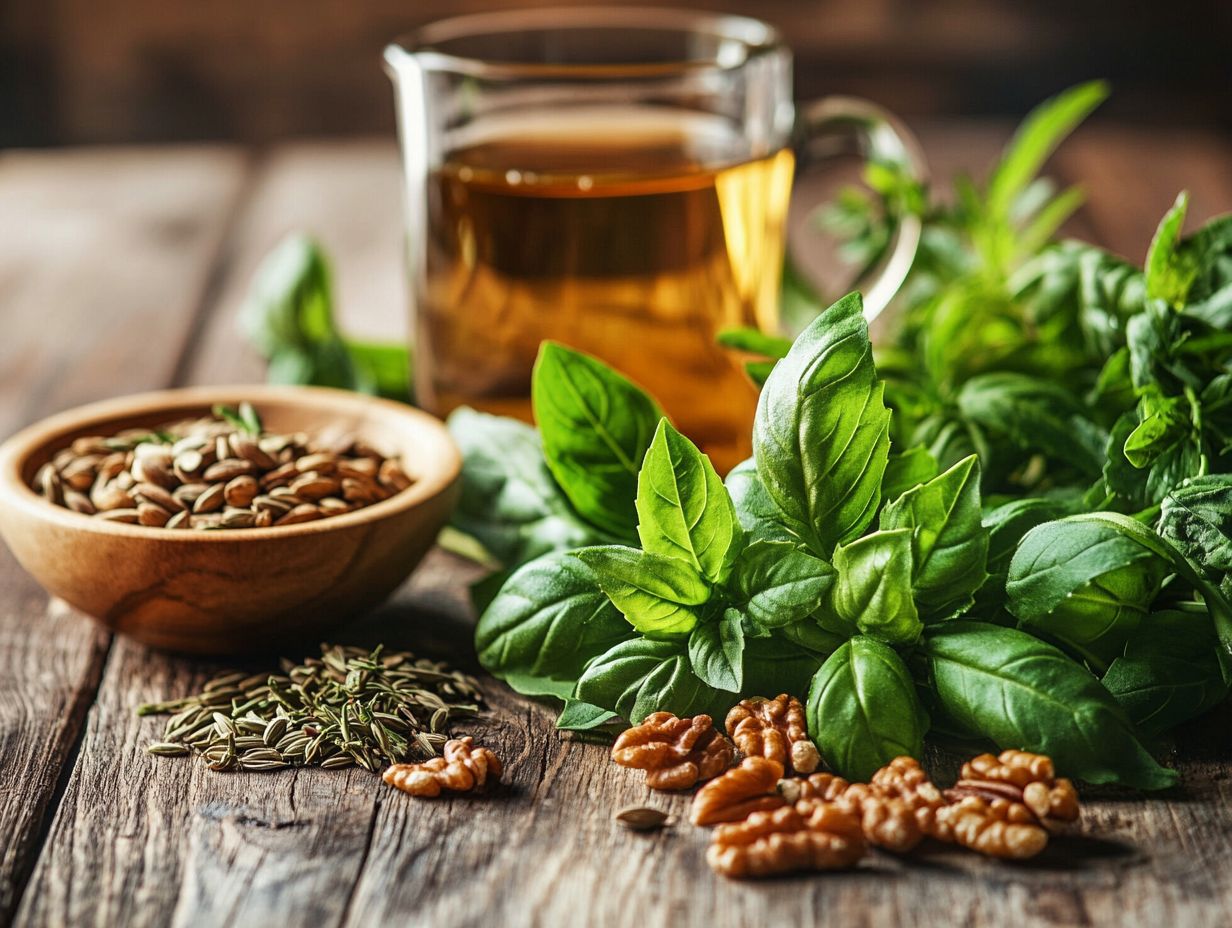
Incorporating herbal solutions into your daily routine can truly elevate your health, especially regarding cardiovascular wellness. However, it s vital to approach this integration with care and consideration.
Understanding the right dosage and preparation methods for each herbal remedy is essential. You should also be aware of potential drug interactions. Monitor your health closely, particularly when combining these remedies with conventional treatments.
By doing so, you can fully harness the benefits of these natural solutions while minimizing any associated risks.
Dosage and Preparation
Understanding the proper dosage and preparation of herbal solutions is vital for ensuring their safety and efficacy when using them for cardiovascular health. Each herb, whether it s garlic, ginger, or hawthorn, comes with specific guidelines regarding the optimal amount to use and the best methods for preparation, such as teas, tinctures, or capsules.
For example, garlic is often recommended in doses ranging from 600 to 1,200 mg per day. Ginger can be beneficial in amounts between 1 to 3 grams daily. Hawthorn, renowned for its heart-supportive properties, typically requires a dosage of 160 to 900 mg, depending on the concentration of the extract.
Remember that preparation methods can significantly impact the potency and absorption of these herbs. Always consider whether to consume them fresh, dried, or in supplement form. Additionally, consulting with healthcare professionals before starting any herbal regimen is crucial. They can provide personalized advice based on your individual health conditions and ensure you adhere to safety guidelines.
Potential Interactions and Side Effects
Herbal remedies offer many health benefits. However, it’s crucial to recognize the potential interactions and side effects that can occur when combined with other medications.
Understanding these interactions helps with tracking medication safety and patient monitoring. This ensures you can safely integrate herbal solutions into your healthcare routine.
Common herbs like garlic and ginkgo biloba can affect blood pressure and blood clotting. These effects may complicate your treatment if you also take cardiovascular medications.
If you re thinking about these natural alternatives, know how these herbs can affect your prescribed treatments. It’s essential to discuss these herbs with your healthcare provider.
Open conversations about any potential risks, such as allergic reactions, promote a safer approach to managing your cardiovascular health.
Frequently Asked Questions
Here s a brief overview of common questions about herbal solutions for cardiovascular health:
What are herbal solutions for cardiovascular health?
Herbal solutions for cardiovascular health refer to the use of plants and plant-based products to improve heart function and prevent heart disease.
Are herbal solutions effective for maintaining cardiovascular health?
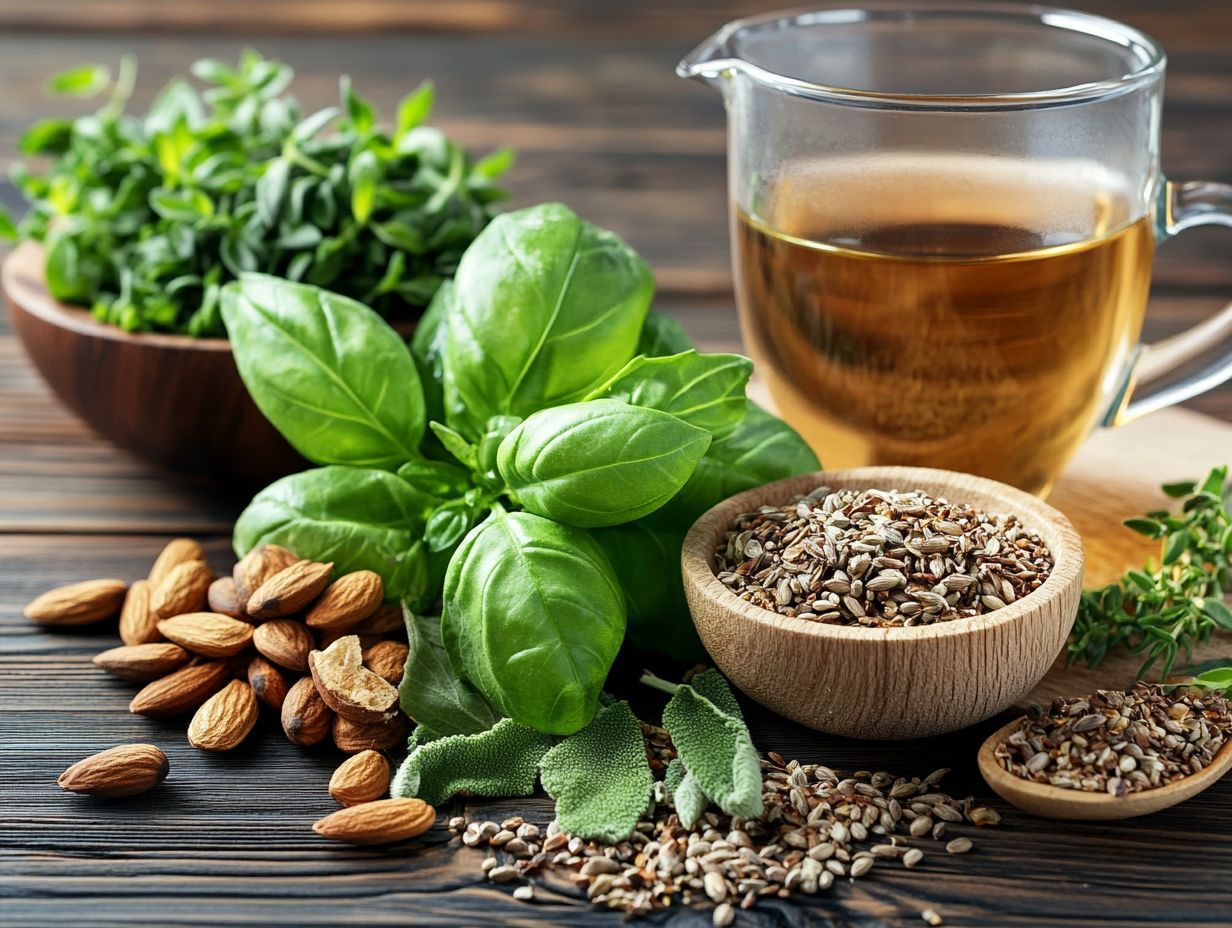
There is some evidence that certain herbs, such as garlic, hawthorn, and turmeric, may have beneficial effects on cardiovascular health. However, more research is needed to fully understand their effectiveness.
What are the potential benefits of using herbal solutions for cardiovascular health?
Some potential benefits of using herbal solutions for cardiovascular health include lowering blood pressure, reducing inflammation, improving cholesterol levels, and promoting overall heart health.
Can herbal solutions interact with medications for cardiovascular health?
Yes, some herbs may interact with certain medications used to treat cardiovascular conditions. You ll want to consult with your healthcare provider before using herbal solutions if you are on any medications.
How should herbal solutions be used for cardiovascular health?
Herbal solutions should be used as directed and in moderation. Follow the recommended dosage and consult with a healthcare provider if you have any underlying medical conditions.
Are there any precautions to consider when using herbal solutions for cardiovascular health?
Some herbs may have side effects or interact with certain medical conditions. It’s important to do thorough research and consult with a healthcare provider before incorporating herbal solutions into your cardiovascular health regimen.
Take charge of your health today talk to your healthcare provider about how herbal solutions can fit into your wellness plan!

